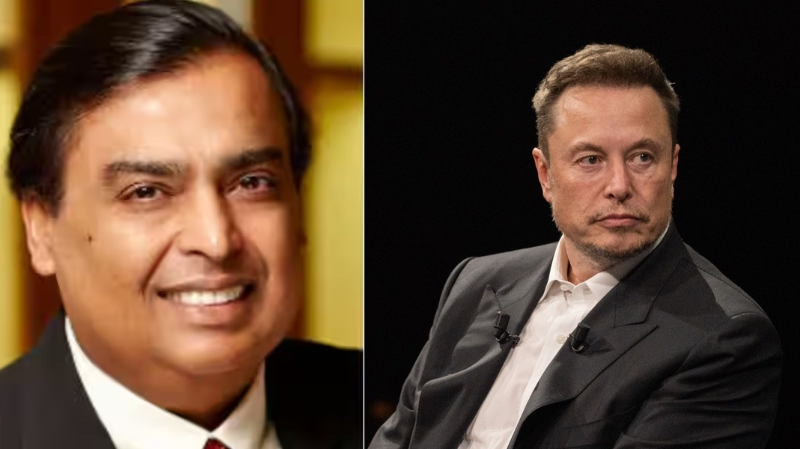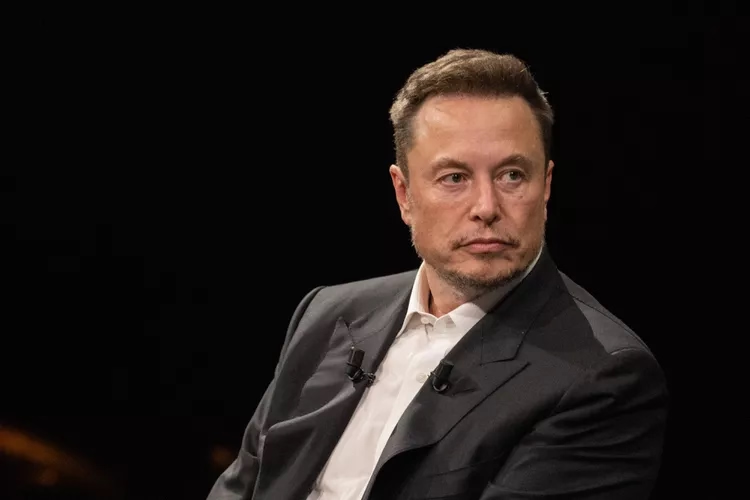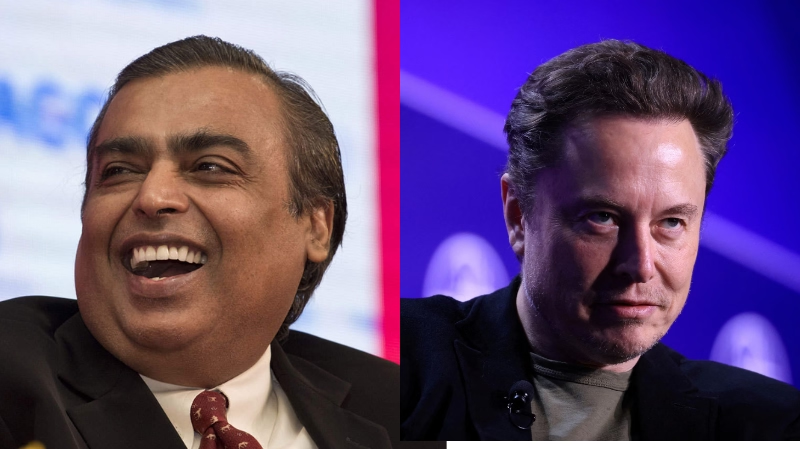The competition between the world’s two richest people, Elon Musk and Mukesh Ambani, is increasing and this competition is for India’s satellite broadband market.
Musk and Ambani have been in constant discussion since the Indian government announced last week that the allocation of satellite spectrum for broadband will be done through an administrative method instead of an auction.
Musk has criticized the auction model in the past as well while Ambani supports it.
Satellite broadband can provide internet facilities anywhere within satellite coverage.
This feature makes it a better option for internet access in remote or rural areas, where internet service is not available traditionally.
It can also help in bridging the digital access gap.
India’s telecom regulator has not yet announced spectrum pricing and commercial satellite internet facilities have not started yet.
However, according to credit rating agency ICRA, the number of satellite internet users in India can reach 20 lakh people by 2025.
Competition between Musk and Ambani

The market is very competitive, there are about half a dozen companies in this sector and Ambani’s Reliance Jio is the main one.
To show its dominance in the telecom sector, Jio has invested billions of rupees in airwave auction, for which Jio has now joined hands with SES Astra, a well-known satellite operator based in Luxembourg.
While Musk’s satellite internet company Starlink uses low earth orbit satellites, i.e. satellites deployed at an altitude of 160 and 1,000 kilometers from the earth, for better speed, SES uses satellites located at higher altitudes, which is a more economical system. Satellite signals reach receivers on the ground and convert it into internet data.
Musk’s company Starlink has 6,419 satellites in orbit and 4 million subscribers in 100 countries. He wanted to start services in India in 2021, but it was delayed due to difficulties in rules and regulations.
Many people say that if his company comes to India this time, it will boost Prime Minister Narendra Modi’s efforts to increase foreign investment in the country.
This will also help enhance the government’s image of supporting businessmen, as well as prove wrong the claims that the government’s policies are made in favor of big businessmen like Ambani.
Although the decision of auction has proved beneficial for the Indian government in the past, but when the government decided to allocate satellite spectrum administratively this time, then the government claimed in its defense that this decision has been taken on the lines of international rules.
What do experts say?

Gareth Owen, a technical analyst at Counterpoint Research, says satellite spectrum is not usually allocated through auctions because the costs involved can deter investment in the business.
In contrast, the administrative allocation would ensure that the spectrum is distributed among “eligible” players in the sector, giving Starlink a chance to compete.
But Ambani’s Reliance says an auction is necessary to ensure fair competition, as there are no clear legal provisions for providing satellite broadband services to people in India.
In letters to the telecom regulator in early October, Reliance urged the government to create a level playing field for satellite-based and ground access (terrestrial-wire or wireless signal) services.
The firm also said that recent advances in satellite technology have blurred the distinction between satellite and terrestrial networks and that ‘satellite-based services are no longer limited to areas where terrestrial network services are not available.’
A letter said spectrum is allocated through auctions under India’s telecom laws, while administrative allocation is allowed only in cases of ‘public interest, government work or technical and economic reasons.’
What question did Musk ask?

On X, Musk said the spectrum “was laid out long ago by the ITU for sharing spectrum for satellites.”
The International Telecommunication Union (ITU), the United Nations agency for digital technology, sets rules for the world, of which India is a member and has signed the agreement.
When Reuters news agency reported that Mukesh Ambani was lobbying the government to reconsider its decision, Musk responded by writing on X, “I will call him (Ambani) and ask if you will have too many problems with Starlink providing internet services to the people of India?” Owen says that opposition to the administration’s pricing method can give Ambani a strategic advantage. It may be that Starlink is out of the Indian market. But Mukesh Ambani is not the only one to support the auction. Bharti Airtel Chairman Sunil Mittal has said that companies intending to provide service to the people of the city should get telecom licenses and buy spectrum like other companies. Mittal is India’s second-largest wireless operator, along with Ambani controls 80 percent of the telecom market. How many users are there in India? Telecommunications expert Mahesh Uppal says such opposition is a way of defense, which The aim is to make it costly for foreign companies, which are seen as a threat in the long term.
“Although there is no immediate competition here, satellite technology is advancing rapidly. Indian telecom companies with large terrestrial operations fear that satellites may soon become competitive and challenge their dominance.”
At stake is clearly the huge Indian market. According to consulting firm EY Parthenon, about 40 percent of India’s 1.4 billion people still do not have access to the Internet, most of them in rural areas.
As for China, according to Data Reportal, which tracks online trends around the world, China has about 1.09 billion Internet users, about 340 million more than India’s 751 million Internet users.
India’s Internet adoption rate still lags behind the global average, which is 66.2 percent. But recent studies show that the country is closing the gap.
Mobile data is cheaper in India
If priced correctly, satellite broadband could help close the gap and also help in the Internet of Things (IoT), a network that connects everyday objects to the Internet and allows them to talk to each other.
According to PM Modi, pricing will be most important in India, where mobile data is the cheapest in the world – just 12 cents per gigabyte.
Technology analyst Prasanto K Roy says, “No one can stop this price war with Indian operators. Musk has a lot of money. He can also offer free services in some areas to gain a foothold in the domestic market of India.”
Starlink has already reduced prices in Kenya and South Africa.
However, this may not be easy. In its 2023 report, EY Parthenon noted that Starlink’s high costs could make it difficult to compete without government subsidies, as Starlink costs about 10 times more than Indian broadband giants.
Providing global coverage requires many more LEO satellites (which are used for Starlink) than MEO satellites, which increases launch and maintenance costs.
And some of the Indian operators’ fears may be unfounded.
“Businesses will never fully switch to satellite unless there is a terrestrial option. Terrestrial networks will always be cheaper than satellite, except in less populated areas,” Owen says.
Musk may have a first-mover advantage, but “satellite markets tend to grow very slowly.”
The battle for the internet of space between the world’s two richest men has truly begun.


